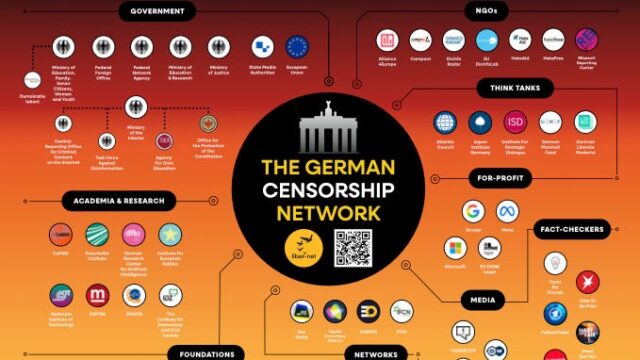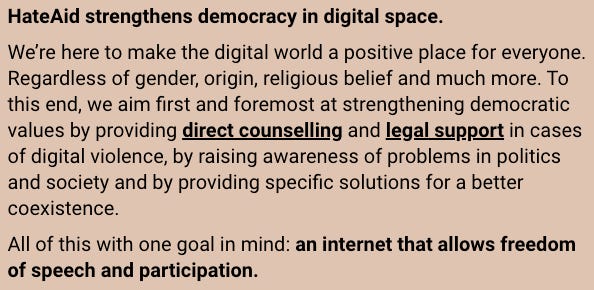The Censorship Industrial Complex’s Power Grip in Germany

Many organizations and federal agencies involved in censoring Americans under the guise of mis/disinformation have shut down in the last couple years. Racket’s Twitter Files exposed the level of censorship slime oozing from organizations such as the Stanford Internet Observatory, the Election Integrity Project, and the Virality Project. On the government side of things, there was the Global Engagement Center, the Foreign Influence Task Force, and the Cybersecurity and Infrastructure Security Agency (CISA), which still exists but is no longer involved in mis/disnfo work.
That’s not to say America is perfect when it comes to free speech, but as Sen. Rand Paul said in September, “throughout government, the censorship apparatus that Biden had put in place is gone.”
However, if you look to Germany, the strongest economic power in the European Union, it’s easy to see where America was going. It has about 330 organizations working with federal and state levels of government to suppress speech and about 425 grants — mostly from the government — that fund this work, according to research from liber-net, a free speech group that tracks censorship.
The most high-profile cases of German censorship, at least in America, have been raids of people who authorities determined had engaged in “digital violence” for offenses that include insulting someone. These raids were the subject of a high-Zprofile “60 Minutes” segment last February. Prosecutors and police largely depend on a system of government-certified and government-funded “flaggers.”
While these incidents understandably get the most attention, the censorship apparatus is much more deeply ingrained in German society, says Andrew Lowenthal, the CEO of liber-net.
“Germany is the most important country doing this type of content controls work in the entirety of the EU and I would argue has a significant influence on the EU. There’s not really any light between civil society and the government.”
As a result, there’s a constant “atmosphere of intimidation,” says Thomas Geisel, a former mayor of Dusseldorf and now a member of the European Parliament.
“People are afraid to speak their mind. That people always have to find some sort of way of expressing their mind in a politically correct way has created a narrower space for discourse, and I think that is really threatening our democracy.”
Liber-net’s report includes a searchable database of organizations involved in content control and the grants that fund their work, categorized from 1-5 flags, with five being the worst for its censorship advocacy.
The report indicates that government funding for content controls peaked in 2023 at about $36 million (converted from euros, as all dollar amounts in this article are) among the German federal and state governments as well as the EU. While the combined funding among the three has decreased to around $23 million, the amount from the German federal government remains roughly the same and has increased since last year.

The “subtle instruments”
In some cases, government money goes to private organizations that act as a middleman for the government. For example, all of the money the private German Research Foundation distributes is provided by the German federal and state governments, and the EU (1%). The foundation awards money to various mis/disinfo causes. In June, it even requested proposals to expand “the term ‘disinformation’ to include claims that may be factually true,” according to liber-net.
The report says the German government has certified four organizations as flaggers, or in the government’s framing, organizations with “specialized expertise and experience in identifying and reporting illegal content.” The Federal Network Agency (Bundesnetzagentur), which enforces the EU’s controversial Digital Services Act, awards grants to these flaggers.
Among them is a group called REspect!. It’s been a government-certified “trusted flagger” since October 2024, which means “deletion requests submitted by REspect! to the platforms must be given priority and processed within a shorter time,” according to a REspect! report. The group received funding directly from a government grant program called “Demokratie leben!,” which translates to Live Democracy!
REspect! has an online portal for people to submit their complaints, which are then forwarded to the proper authorities such as the Bavarian Police. That was the case for one person who had the audacity to call a German politician a “Dummschwätzer” on Facebook — which roughly translates to “blowhard” — as documented by the Bundestag in a list of attacks against politicians and political parties.

Another “trusted flagger” is HateAid, which received its certification in June after proving its bona fides in other aspects of Germany’s censorship apparatus since its founding in 2018, garnering at least $5.2 million in government funding, according to liber-net.
HateAid purports to be a defender of free speech. From its homepage:

However, HateAid, armed with public funding, will go after people who express the wrong opinion. Take the Russia-Ukraine war, according to liber-net:
HateAid has also notably pursued the censorship of those protesting Berlin’s backing of Kiev; it has classified the hashtag “Kriegstreiber” (or “Warmonger”) as “pro-Kremlin propaganda” whose effect is to “undermine the credibility of politicians” supporting Berlin’s war efforts.
HateAid even warns that the “warmonger” hashtag from “small pro-Kremlin accounts” can shape public debate because they respond to channels with large audiences, such as those of politicians and journalists (bold emphasis is HateAid):
These are retweeted or commented on preferentially in order to spread the narrative of the “warmonger”. In this way, even small accounts can share propaganda with enormous reach. As a result, they enter the centre of society, where they are also perceived and taken up by citizens who are reading along. In effect, they are free riders on the reach of these accounts and can thus shape the public debate.
The CEO of HateAid, Josephine Ballon, was part of the 60 Minutes piece mentioned above. She declared that “free speech needs boundaries.”
Without speech boundaries, Ballon argued that people will be afraid to participate in political discussions.
“This is not only a fear, it’s already taking place. Already half of the Internet users in Germany are afraid to express their political opinion, and they rarely participate in public debates online anymore.”
There lies the rub: is that because people are afraid of being criticized or attacked online, or because people are afraid of being turned over to authorities by the government’s “trusted flaggers” such as HateAid and REspect!?
Geisel says Germany’s censorship apparatus is having a similar effect as anti-speech laws in Russia, which, after invading Ukraine, made “discrediting the armed forces” a crime.
“It’s a lot more subtle [in Germany], but the result is very similar in that you simply don’t speak your mind anymore because there are more subtle instruments preventing you from speaking your mind.”
He points to the highly publicized case of political scientist Ulrike Guerot as an example. Guerot was a political science professor at the University of Bonn until she was fired in 2023 after outrage over a book she co-authored, “Endspiel Europa,” which translates to “Endgame Europe.” Guerot argued that “Ukraine had the role of starting a war with Russia on behalf of the West, which was then to be backed militarily and logistically by NATO member states…”
Officially, Guerot was fired for plagiarism, although she maintains there were only minor problems and that the accusations were a pretext for firing her over her views.
Guerot said liber-net’s report is eye-opening because it maps out a censorship network that makes clear to her the problem is worse than she realized.
“It draws the line between the dots and you say, ‘Ah, this is connected to this and they got the money from there.’ And that’s why it’s called a censorship network. It’s like a spider net, and there are the dots and it’s all connected. And in this respect, I must admit it was absolutely breathtaking.”
https://www.racket.news/p/the-censorship-industrial-complexs
